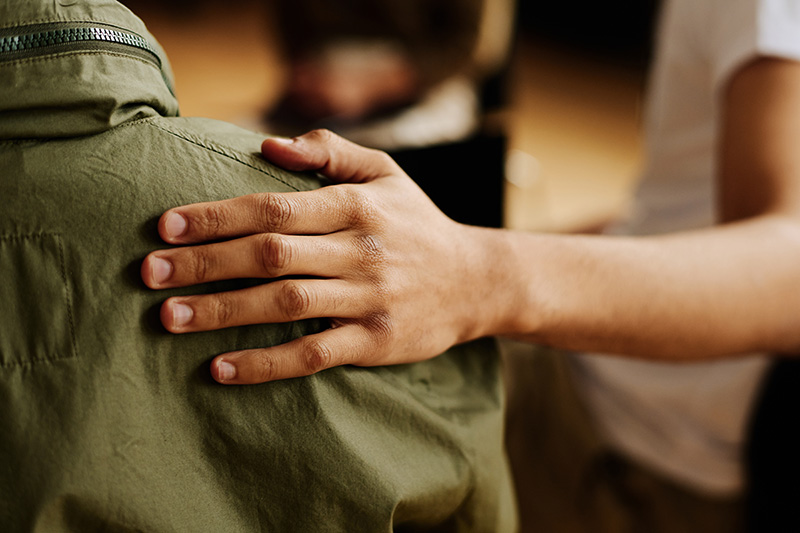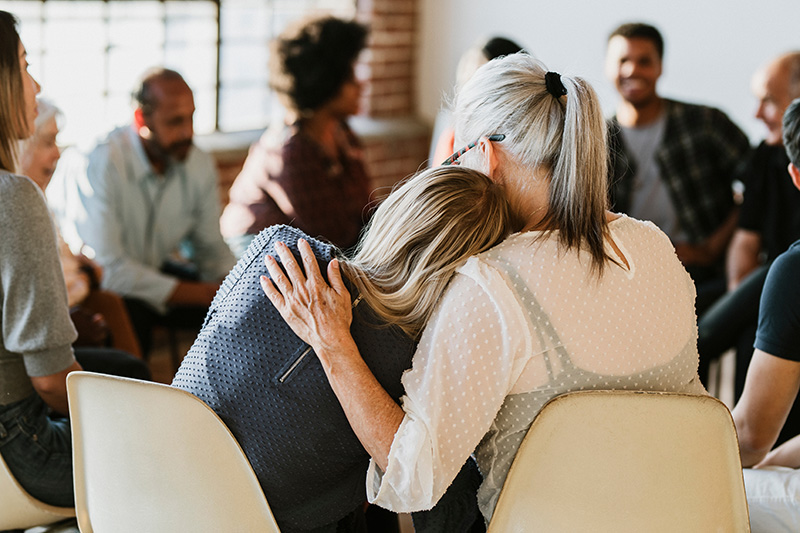Transitional housing that keeps you grounded
Recovery from addiction is a journey, not a single destination. For people transitioning from intensive treatment back to daily life, maintaining sobriety can feel overwhelming. Sober living helps bridge the gap between treatment and independence, giving you a chance to make progress and practice skills with support. Sober living is a transitional service available to clients in the addiction treatment programs at Discover Recovery.
What is a sober living program?
A sober living program is a transitional housing arrangement designed for people in recovery from addiction. It offers a secure, substance-free environment where people live while rebuilding healthy habits and practicing life skills. Unlike inpatient treatment, sober living allows residents to engage with life outside of the program while still maintaining the support of a recovery-focused community.
The sober living program at Discover Recovery
Our sober living program is available to clients in treatment at our campuses in Camas and Long Beach, Washington. It might be a good fit for you or a loved one if continued support is needed after completing a higher level of care like detox or residential treatment.
We do not currently offer sober living at our Portland, OR location, but clients can travel to Camas if needed. Clients in Portland can access a partial hospitalization program (PHP), an intensive outpatient program (IOP), and aftercare services.
High-end, unique amenities
Our sober living homes are as comfortable as they are therapeutic. We provide a safe, calming environment where clients can focus on their recovery. From chef-prepared meals to weekly creative workshops like pottery and expressive arts, we prioritize healing both body and mind.
Continued support
Support groups, connections to our treatment team, and help from others in our sober living spaces give residents opportunities to talk to someone when they need extra help. Community is one of the most valuable tools during early recovery, and our sober living program is a great opportunity to build it.

A day in the life: sample sober living schedule
Schedules vary by location and clinical needs. Case managers work closely with clients to develop a structure that balances autonomy with recovery. While every client’s routine may look different, a typical day in sober living might include:
7:00 AM
Morning meditation and house check-in
8:00 AM
Breakfast and personal hygiene
9:00 AM
Group therapy or outpatient programming
12:00 AM
Lunch (often prepared in community)
1:00 PM
Life skills workshops (budgeting, resume building, cooking)
3:00 PM
Free time, wellness activities, or individual therapy
6:00 PM
Shared dinner
7:00 PM
Evening support meeting or journaling
10:00 PM
Quiet hours

Access to Washington’s natural beauty and resources
With its serene coastlines, lush forests, and calm lakes, Washington State provides a tranquil environment for reflection and renewal. Outings and opportunities led by the Discover Recovery team can allow you to reconnect with your health, peace, and purpose while living in a substance-free space.
Connection to local recovery resources
Washington offers many recovery and mental health resources, including support groups, outpatient treatment centers, and events celebrating sobriety. Plus, our case management services can help with things like job placement, financial planning, and referrals to specialists for continued care.

Why clients choose Discover Recovery for sober living
- Comfort-focused design: Clean, furnished residences with shared or semi-private rooms
- Peer accountability and community
- Clinical oversight and ongoing case management
- Optional wellness activities like yoga, sound baths, and expressive arts
- Integration into a full continuum of care
We prioritize privacy, dignity, and meaningful recovery—without sacrificing comfort or community.
Frequently asked questions
What’s the difference between sober living and rehab?
Rehab, or residential treatment, is a clinically structured environment with 24/7 support. Sober living offers more independence—it’s a supportive, substance-free living space where clients can begin working, attending school, or reengaging with the outside world while staying connected to recovery.
How long can you stay in a sober living house?
Most clients stay 30 to 90 days, though some choose longer depending on their needs, insurance, and life circumstances. Our team will help you determine the best timeline for your recovery.
What happens in sober living?
You’ll live in a shared, recovery-focused home with daily routines, community support, and optional participation in wellness activities. Many clients continue outpatient treatment or attend support groups during this time. House meetings, accountability, and peer connection are at the center of the sober living experience.
What are transitional housing requirements?
Clients in sober living are expected to maintain sobriety, participate in house responsibilities, attend support meetings, and follow community guidelines. These rules help create a structured and respectful environment that supports recovery.
How do sober living houses work?
Residents live together in a shared home with support from staff and peers. Some services—like case management, job search help, or recovery coaching—are often included. The goal is to provide structure and accountability during the transition to independent living.
Is there support once you leave sober living?
Yes. Discover Recovery provides aftercare planning and alumni support services. Our goal is to stay connected to clients long after they leave formal treatment, offering ongoing encouragement, referrals, and connection to community-based resources.
Is sober living available at your Portland location?
No. Our sober living residences are available only at our Camas and Long Beach, WA campuses. Clients in Portland can access PHP, IOP, and aftercare services, but transitional housing is not available at that location.
Explore More From Discover Recovery
Relapse Prevention Group Activities: Engaging Ways to Stay on Track
Recovery from a mental health condition such as substance abuse and addiction is a difficult journey marked by many highs...
Understanding Your Rights: Going to Rehab Without Losing Your Job
The decision to seek addiction treatment can be daunting. One of the most common concerns is: “Can I get fired...
The Dangers of Mixing Hydrocodone and Alcohol: What You Need to Know
What is Hydrocodone? Hydrocodone is a prescription opioid pain medication classified by the Drug Enforcement Administration (DEA) as a...
Creating an Effective Aftercare Plan: Examples and Tips for Sustained Recovery
People who have completed addiction treatment or are about to finish a treatment program are often advised to figure out...
OCD and Alcohol: Understanding the Connection and Finding Help
Obsessive-compulsive disorder (OCD) is a mental health condition characterized by recurrent uncontrollable thoughts (obsessions) and repetitive behaviors (compulsions). Alcohol use...
How Many Meth Addicts Recover: A Helpful Guide
Wondering how many people overcome meth addiction? Recovery is possible when determination meets professional support. Each journey looks different, but...











